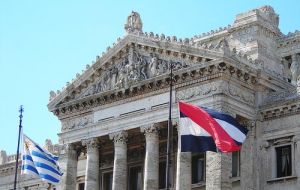MercoPress. South Atlantic News Agency
Uruguayan opposition with good chances of winning October election
 Whoever is elected President, will have to work much closely with the Uruguayan Parliament, anticipate international analysts.
Whoever is elected President, will have to work much closely with the Uruguayan Parliament, anticipate international analysts. Even when the Uruguayan ruling coalition is ahead in vote intention for next October’s general election, according to the latest tendency from public opinion polls the deterioration of the Uruguayan economy in coming months plays in favour of the opposition, said the latest report from The Economist Intelligence Unit.
The report anticipates, most probably, a run off (a month later) for the presidential post and also forecasts that the next government will not have the parliamentary majority enjoyed by the current Broad Front ruling coalition.
Furthermore for the coming 2010/2015 period, whoever wins, will need to work in close contact with the legislative and creating the necessary consensus to have bills and reforms passed.
This in a scenario of adverse economic conditions compared to those enjoyed by the current ruling coalition, which will naturally lead to a more challenging political situation for the next administration, anticipates The Economist.
When the ruling coalition took office in 2005 Uruguay was steaming ahead following on the recovery from one of the worst collapses of its banking system in 2002, a spill over from the melting down and default from neighbouring Argentina.
Another report on Uruguay, but from the US bank JP Morgan points out that of the two main presidential candidates of the ruling coalition, markets prefer the more conservative Danilo Astori and his orthodox approach to economics over his rival Jose Mujica.
However the report admits that opinion polls show that the possible nomination chances of Astori as presidential candidate in the coming ruling coalition primary are “ever more distant”.
JP Morgan also underlines that the interest on the Uruguayan October election is becoming less economic and increasingly political.
Both The Economist and JP Morgan argue that even when opinion polls show the ruling coalition several points ahead of the main opposition Partido Nacional, the advantage is not enough to ensure a victory in the first round and a run off is anticipated for November, when a unified opposition makes the election result even more uncertain.
The latest data released by the Central Bank indicates that the Uruguayan economy contracted 2.9% in the first quarter of this year after 18 consecutive expansion quarters.




Top Comments
Disclaimer & comment rulesCommenting for this story is now closed.
If you have a Facebook account, become a fan and comment on our Facebook Page!